
Financial Innovation (Collection)
Addison Wesley
978-0-13-309359-9 (ISBN)
- Titel ist leider vergriffen;
keine Neuauflage - Artikel merken
After the global financial crisis, responsible financial innovation is more crucial than ever. However, financial innovation will only succeed if it reflects the true lessons of the past decade. In this collection, three leading global finance researchers share those lessons, offering crucial insights for market participants, policymakers, and other stakeholders. Drawing on their pioneering work, they illuminate new opportunities for sustainable innovation in finance that can help restore housing markets and the overall global economy, while avoiding the failures of predecessors. In Financing the Future, Franklin Allen and Glenn Yago carefully discuss the current role of financial innovation in capitalizing businesses, industries, breakthrough technologies, housing solutions, medical treatments, and environmental projects. Allen and Yago explain how sophisticated capital structures can enable companies and individuals to raise funding in larger amounts for longer terms at lower cost, accomplishing tasks that would otherwise be impossible -- and offer a full chapter of essential lessons for using financial innovation to add value, manage risk, and improve the stability of the global economy. Next, in Fixing the Housing Market, Allen, Yago, and James R. Barth explain how responsible financial innovation can "reboot" damaged housing markets, improve their efficiency, and make housing more accessible to millions. The authors walk through the history of housing finance, evaluate housing finance systems in mature economies during and after the crisis, highlight benefits and risks associated with each leading mortgage funding structure and product, and assess current housing finance structures in BRIC economies. Building on these comparisons, they show how to create a more stable and sustainable financing system for housing: one that provides better shelter for more people, helps the industry recover, and creates thousands of new jobs.
From world-renowned leaders and experts Franklin Allen, Glenn Yago, and James R. Barth
Franklin Allen is Nippon Life Professor of Finance and Professor of Economics at The Wharton School of the University of Pennsylvania, where he has been on the faculty since 1980. A current co-director of the Wharton Financial Institutions Center, he was formerly vice dean and director of Wharton Doctoral Programs as well as executive editor of the Review of Financial Studies, one of the nation’s leading academic finance journals. Allen is a past president of the American Finance Association, the Western Finance Association, the Society for Financial Studies, and the Financial Intermediation Research Society. Allen has co-authored three editions of the leading textbook Principles of Corporate Finance. He holds a doctorate from Oxford. Glenn Yago is Senior Fellow/Senior Director at the Milken Institute and its Israel Center. As visiting professor at Hebrew University of Jerusalem, he directs the Koret-Milken Institute Fellows program. Yago founded the Institute’s Financial Innovations Labs®, which focus on the innovative use of finance to solve long-standing economic development, social, and environmental challenges. His research and demonstration projects have contributed to policy innovations fostering the democratization of capital to traditionally underserved markets and entrepreneurs in the US and worldwide. James R. Barth is Lowder Eminent Scholar in Finance at Auburn University and a Senior Finance Fellow at the Milken Institute. His research focuses on financial institutions and capital markets, both domestic and global, with special emphasis on regulatory issues. He led an international team advising the People’s Bank of China on banking reform, and traveled to China, India, Russia, and Egypt to lecture on finance for the U.S. State Department. He has been a visiting scholar at the U.S. Congressional Budget Office, Federal Reserve Bank of Atlanta, Office of the Comptroller of the Currency, and the World Bank, and has testified before the U.S. House and Senate banking committees on several occasions. His most recent book is Guardians of Finance: Making Regulators Work for Us.
Financing the Future: Market-Based Innovations for Growth
Acknowledgments vi
About the Authors ix
About the Milken Institute xi
Chapter 1 The Evolution of Finance 1
Chapter 2 A Framework for Financial Innovation: Managing Capital Structure 27
Chapter 3 Innovations in Business Finance 51
Chapter 4 Innovations in Housing Finance 85
Chapter 5 Environmental Finance: Innovating to Save the Planet 117
Chapter 6 Financing the Developing World 149
Chapter 7 Financing Cures 185
Chapter 8 Six Cardinal Rules of Financial Innovation 215
Appendix The Black–Scholes Formula 225
Index 227
Fixing the Housing Market: Financial Innovations for the Future
Acknowledgments vi
About the Authors viii
About the Milken Institute x
Chapter 1 Housing Crises Go Global: The Boom, the Bust, and Beyond 1
Chapter 2 Building Blocks of Modern Housing Finance 21
Chapter 3 Turmoil in Global Housing Markets: Implications for the Future of Housing Finance 69
Chapter 4 Housing Finance in the Emerging Economies 103
Chapter 5 Future Innovations in Housing Finance 139
Chapter 6 Lessons Learned—Back to the Future 171
Index 181
| Erscheint lt. Verlag | 22.5.2012 |
|---|---|
| Verlagsort | Boston |
| Sprache | englisch |
| Gewicht | 1 g |
| Themenwelt | Wirtschaft ► Betriebswirtschaft / Management ► Finanzierung |
| Betriebswirtschaft / Management ► Spezielle Betriebswirtschaftslehre ► Bankbetriebslehre | |
| Wirtschaft ► Volkswirtschaftslehre | |
| ISBN-10 | 0-13-309359-X / 013309359X |
| ISBN-13 | 978-0-13-309359-9 / 9780133093599 |
| Zustand | Neuware |
| Haben Sie eine Frage zum Produkt? |
aus dem Bereich

